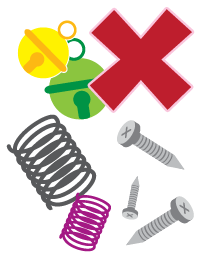Q: My baby is now 4 months old and he has been healthy and cheerful. However, he drinks less milk than before. Is he rejecting milk?
Babies grow quickly in their first 2-3 months. After that, their rate of growth will slow down and their activity level will decrease. As a result, they may consume less milk, sometimes even less than their milk intake in the first two months. As he gets full easily now, he may turn his head away to show that he already has enough milk. It doesn't mean that he dislikes milk or refuses the taste. As long as your baby stays active, has normal growth and development, he is having adequate nutrition. The reduction in milk intake should not be a cause of concern to you.
Q: Should I stop my baby from mouthing objects?
Babies like to explore their surroundings with their senses at this stage; therefore, they like to grasp objects and put them into their mouth. Babies actually start sucking their fingers when they are 2 months old. Touching and mouthing objects are their unique ways of exploring the world, thus need not to be stopped.
Nonetheless, you need to ensure that the toys your baby put into his mouth are safe, having no sharp edges, free of rust and toxic coating, or not having small components. You also have to keep the toys clean too.

Q: Why is my baby always drooling? Is she teething?
Many babies drool heavily at 4 to 6 months old. As it is also the time of teething, so drooling is usually mistaken as a sign of teething.
The heavy drooling at this age is a sign that the maturing digestive system is getting ready for solid food. As the babies have not yet learned how to swallow the saliva, lots of saliva may end up drooling from the mouth. In addition, most babies will have their first tooth during their 6 to 10 months of age when they also have swollen gum and heavy drooling. However, this will improve when the babies reach 1 year old. Therefore it should not be a cause of concern to you.
What you need to do is wiping your baby's saliva and replacing a dry bib for her frequently, sometimes a few bibs in a day, to prevent the saliva from irritating her skin and causing rashes.
However, if your baby has other symptoms apart from drooling, such as swelling of throat, constant coughing, shortness of breath, vomiting and fever, you should take her to the doctor immediately.
Q: It's amazing to see that my baby is having his first tooth! However, I am worried that teething will usually come with fever and diarrhea. Is it true?
Teething will not lead to fever and diarrhea. However, as babies like to chew things when teething, it is more likely for them to get infected. If your baby has fever or other symptoms like runny nose, diarrhea or vomiting, you should bring your baby to the doctor immediately.
The following are the common signs of teething:
- Gum swelling
- Itchy gums
- Drooling
- Irritability
These symptoms usually occur around teething and last for about a week. They will subside after a week unless your baby has his teeth one after another consecutively.
To alleviate his teething discomfort, you can give your baby teething biscuits and clean, sturdy teething rings to chew on. You can also massage his gum with your finger. Spending more time playing and interacting with your baby will keep him in a more cheerful mood and reduce his agitation. Do take note of the product safety when choosing teething rings.

Q: What can I do if my baby has constipation?
In general, it is less common for babies younger than 6 months to have constipation, particularly those who are on breastmilk as it contains sufficient water and is easy to digest and absorb. When babies change to feed on formula milk, or when they start taking solid food at about 6 months old, their stools might become hardened, with less frequent bowels. You may worry that your baby is constipated. In fact, normal bowel habit varies among children. The frequency of bowel motion is not the sole symptom to determine if the child constipates or not. As long as the stools are soft, it is regarded as normal. If your baby has dry and hard stool, it may tear the anal tissue when passes through the anus, and causes pain. To avoid the pain, the baby may suppress the need to pass stool, making constipation worse. To improve stool consistency, beware of the following points:
- First, parents may notice a change in their baby's bowel habit when switching from breast milk to formula or from one formula to another. This is because the composition of milk is different and the amount of additives like iron, prebiotics, etc, also vary among different brands. There is no need to worry or switch to another brand of formula. Also, do not mix different formulas in preparation but to follow the manufacturer's instruction on the can to prepare the formula correctly so that your baby gets sufficient nutrients and water. If necessary, let your baby drink a small amount of water between meals.
- Second, after introducing solid foods to your baby, make sure he is having enough water. You should also include fruits and vegetables in his diet for adequate fibre intake. Mashed apple, pear, broccoli and spinach are good choices.
- If your baby's condition has not improved after you have tried all the methods mentioned above, or if your baby is having abdominal distension or blood in the stool, you should consult a doctor. Never use any laxatives or enemas on your own as these may cause adverse health consequences.

